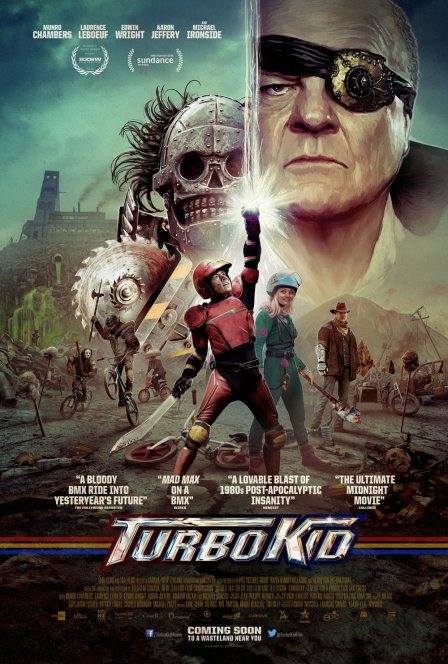Back when video stores were still a thing (Christ, that makes me sound old), you could get lost in the aisles staring at fantastic box art that promised adventure and amazing sights. Of course, the films rarely lived up to those incredible images; occasionally, the box art had nothing to do with the film it contained. Instead, they were just an artist’s vision of what the film could be. Because of this, many a store browser’s dreams were crushed when bringing home a subpar sci-fi or action flick that never lived up to its box art depictions of robots, ungodly violence, or at least an intriguing story. That dream of the 80s is alive, but does not disappoint, in Turbo Kid. It’s as if all those superlative boxes came together to actually birth out a film, one that’s in the Spaghetti Post-apocalyptic vein of such works like The New Barbarians or 1990: The Bronx Warrior. Turbo Kid proudly (and loudly) wears its influences on its sleeve, but it never feels like it’s aping a certain design or aesthetic. This is a genuine film made with lots of guts (literally, on the screen) and heart.
It’s the post-apocalyptic world of 1997 and water is scarce; it’s mainly controlled by bad guy Zeus (Michael Ironside), who rules over the wasteland with an iron fist (and iron helmet). The Kid (Munro Chambers) is a loner who has managed to survive the desolate world since the untimely death of his parents many years ago. Into his life wanders Apple (Laurence Labeouf) a girl with a big secret but also a bigger heart. The Kid wants to be a loner but — like the audience — can’t help falling for her. They end up running afoul of Zeus and his goons, but not before the Kid finds a Turbo suit left over from the wars. Can he and Apple survive in this world that is as lacking in sentiment as it is in water? Oh, and everyone rides BMX bikes.
I’ve seen Turbo Kid three times now, and it’s been a joyous ride every time. It’s a celebration of the films that came before it, but also a celebration of our willingness to continue to go further with filmmaking. With a minimal budget, the trio of filmmakers known as RKSS have crafted a work that delivers not just on spectacle but also on emotions. The basic hero’s journey stuff is in there, and done properly, but it’s really in the relationship between Apple and the Kid that the writing and directing shine. They can’t help but be funny and endearing, even amidst all the splatter and gore that goes on around them. By nailing the human center, RKSS is able to go to the outer reaches of good taste with their action and violence. It’s a feat that other filmmakers should pay attention to — even in a preposterous set-up like an alternate 1997 where BMXing is the best mode of transportation, if the story is grounded in humanity, viewers are willing to travel wherever the story goes.
The film is shot in desolate gray locations in wide shots, with the only color being the characters onscreen. This is exactly in keeping with those Italian Mad Max ripoffs, although they were more reticent to use such bright colors as RKSS chooses. The retro synth score by Le Matos also drives much of the old-school feeling, with catchy electronic loops echoing either the joy or the peril of the situation. With the cinematography and score properly settled, the filmmakers very quickly set up the world they have created — while it’s an absurd one, it’s also one that makes sense somehow, with arm wrestling nomads, cyborgs that look like Big Trouble In Little China castaways, and an evil henchman who always wears a skull mask so you know he’s evil.
While it features the disintegration of multiple of individuals, Turbo Kid is a film made with a lot of humanity in terms of heart and talent. True, it might not be for everyone, but if you’re a viewer like me, it just might feel like it was made especially for you. For this viewer, it brought the sense that someone had been able to read my filmic dreams and desires, put them up onscreen in all their demented glory, and remind me of the joy that cinema can bring. In other words, Turbo Kid finally delivers on all the hopeful, yet formerly unfulfilled, promises of the VHS box art of the past.

